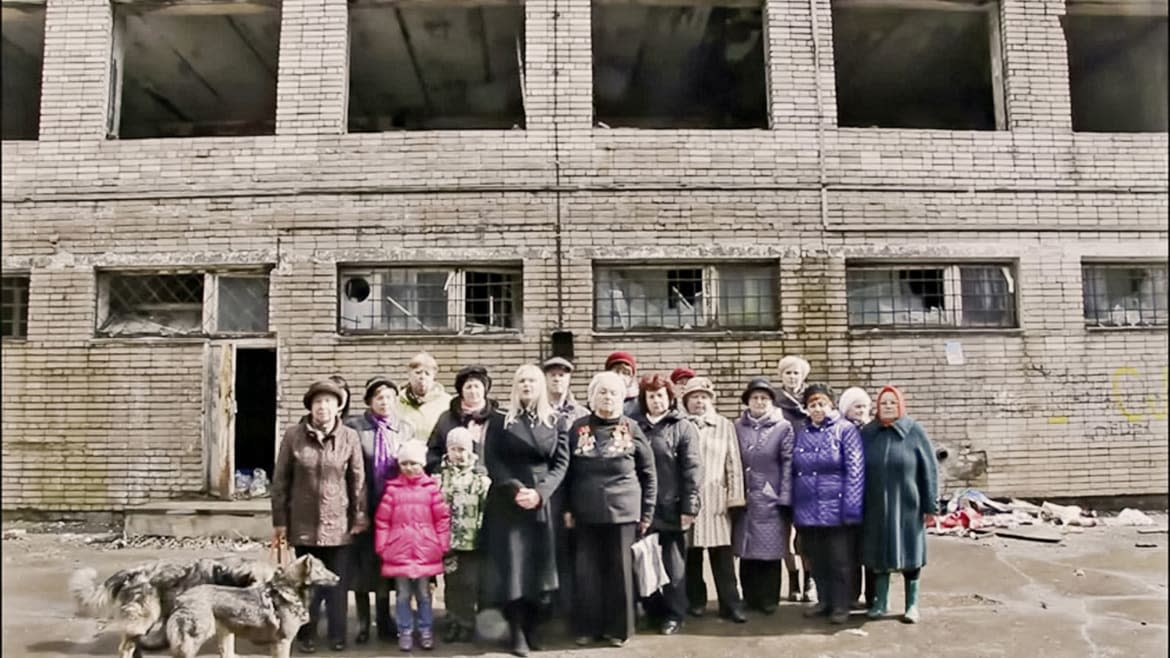The Working-Class People of Russia Give Putin the Finger in New Documentary

The Foundation Pit, a dystopian novel by the Soviet satirist Andrei Platonov (written in 1930, but not published in the Soviet Union until 1987) is oddly pertinent to the struggles of post-Soviet Russians. A fanciful narrative that captured the absurdities of living in the Stalinist era, the plot concerns a group of workers who become drained of all energy when they’re sucked into a foundation pit of a gigantic house meant to house the entire country’s working class. The absurdist premise is a metaphor for the gap between idealistic rhetoric and authoritarian reality that inspired black humor during those dark times.
A similar hypocrisy is evident in Vladimir Putin’s Russia, a country where gangster capitalism, not state socialism, reigns supreme. Andrey Gryazev’s documentary The Foundation Pit, which premiered at the Berlin Film Festival, opens with a pre-credits sequence of Russian newscasts reporting incidents in which hapless house owners or workers have been injured in accidents involving foundation pits. Tractors, excavators, and even some people are sucked into the black holes of Russian foundation pits. Platonov’s satirical barbs resemble the stuff of everyday life in the land of Putin.
‘Undine’ Is a Mermaid Love Story Unlike Any You’ve Seen
The 7-Year-Old Trans Girl That’s Captivated the Berlin Film Festival
The remainder of Gryazev’s film is entirely comprised of public access YouTube videos in which ordinary Russian citizens, deprived of any other forum to voice their grievances, address President Putin with a litany of complaints. As the Russian journalist Larisa Malyukova notes, Gryazev depicts a “phantasmagorical landscape of a giant country where people try to survive, but can’t.”
YouTube provides a perfect outlet for Russians fed up with the government’s negligence and corruption, as well as the private sector’s sheer incompetence. They plaintively catalogue their woes to “Vladimir Vladimirovich,” the seemingly omnipotent leader who they know will never issue a response. Still, the confessional format allows ordinary men and women the opportunity to vent. Cries of pains form a cumulative moan. “You have nothing good for my country,” insists one man. Others point out that Putin is a multi-billionaire, but seems oblivious to the needs of those who have nothing. Even more bluntly, one exasperated guy proclaims that Putin should be “put up against a wall and shot.” Several people admit that their homes are encrusted with filth.
Although The Foundation Pit is essentially a film without an author, the pleas to, and tirades against, Putin are organized into a series of thematic clusters. Early on, there’s a focus on the rotting houses that are the result of corrupt real estate interests, the fruits of a system that went straight from subsidized state housing to inept privatization. One man gives the unseen Vladimir Vladimirovich a tour of his damp house where the walls are covered with moss. Another desperate complainant insists that, despite his down payment on a house, he was swindled out of his money and lost his entire savings.
The plight of homeless families on the street proves especially poignant. It’s also heart-rending to hear a child maintain that he can’t obtain the proper medication to treat his chronic ailment.
Despite these hellish reports from a country whose leader has lost touch with the needs of its most impoverished citizens, it’s heartening to see that many disgruntled Russians, especially women, from neglected provincial cities have banded together to publicly protest widespread environmental devastation. These brave souls, who resent the fact that their cities have become dumping grounds for poisonous waste, surely must know that Putin will remain oblivious to their outrage. They are the true conscience of a country where journalists and activists fear for their lives.
Of course, Gryazev’s compilation documentary, a valuable form of oral history, is inevitably limited by the lack of a wider historical context that might shed light on the origins of this widespread misery. For a more in-depth portrait of Putin’s kleptocracy, the work of journalists such as Masha Gessen and Anastasia Kirilenko is essential.
Get our top stories in your inbox every day. Sign up now!
Daily Beast Membership: Beast Inside goes deeper on the stories that matter to you. Learn more.


